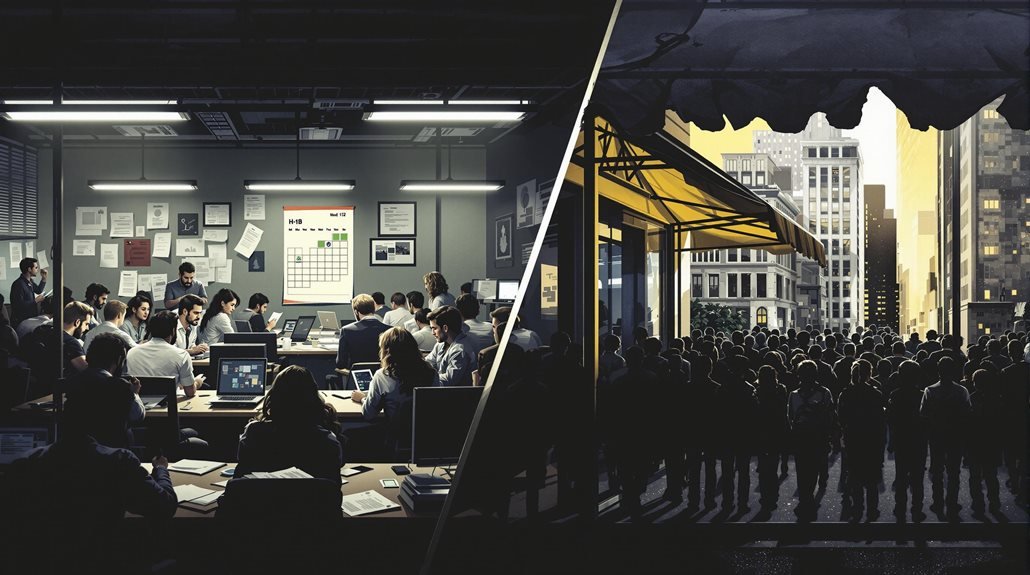The recent changes implemented by USCIS regarding H-1B visa rules have resulted in a remarkable 38% decrease in applicant registrations for fiscal year 2025. This decline reflects stricter selection processes designed to enhance fairness and integrity. Importantly, the average number of registrations per beneficiary has dropped considerably. As these regulations aim to foster equitable access, the implications for skilled labor, particularly from India, warrant further examination. What might this mean for key industries dependent on this talent?
Key Changes in the H-1B Visa Selection Process
The recent modifications to the H-1B visa selection process reflect a concerted effort by USCIS to enhance fairness and reduce the potential for manipulative registration practices.
The revised rules stipulate that each beneficiary may only be registered once, irrespective of multiple employer sponsorships, greatly impacting the H-1B eligibility criteria.
This approach targets manipulation prevention, ensuring equitable access to the registration process for all applicants.
Impact of the New Rules on Registration Trends
Although the new rules implemented by USCIS aim to streamline the H-1B visa selection process, they have led to notable shifts in registration trends for fiscal year 2025. A significant 38% drop in registrations reflects a change in applicant behavior, suggesting that the rules are effectively fostering selection fairness.
The average number of registrations per beneficiary decreased from 1.70 to 1.06, indicating a reduction in attempts to manipulate the system.
While the unique beneficiaries slightly decreased, the overall registration decline raises concerns about the impact on future applications and the ability of qualified candidates to secure positions within the U.S. workforce.
H-1B Visa Significance for Indian Professionals
Notable implications arise from the recent changes in the H-1B visa program, particularly for Indian professionals who comprise a substantial majority of the beneficiaries.
The H-1B visa offers numerous advantages, enabling skilled Indian workers to engage in high-demand employment sectors within the U.S. This visa facilitates access to valuable industry experience and opportunities for professional growth.
Moreover, with over 72% of H-1B visas granted to Indian applicants, their contributions are essential to the U.S. tech landscape. Consequently, Indian employment greatly influences both the economy and innovation, making the H-1B visa a crucial pathway for professional aspirations.
Challenges and Streamlining of the Renewal Process
Amid ongoing challenges within the H-1B visa renewal process, officials have introduced reforms aimed at alleviating bottlenecks that have historically plagued applicants.
The renewal hurdles considerably impact timelines, as appointment delays at U.S. consulates contribute to prolonged waiting periods for essential document submissions. Efforts to streamline the renewal process include initiatives designed to minimize backlogs and enhance scheduling efficiency.
However, despite these reforms, applicants continue to face pressure due to high demand for limited appointment slots. As the supply of available visas tightens, the implications for skilled professionals seeking U.S. employment remain a critical concern for employers and applicants alike.
Frequently Asked Questions
How Does the H-1b Visa Affect Job Opportunities in the U.S. Tech Sector?
The H-1B visa notably influences the U.S. tech job market, enhancing accessibility for skilled international professionals. Its impact fosters innovation and competitiveness, yet ongoing changes may restrict opportunities, shaping future employment dynamics and availability.
Can H-1b Holders Apply for Permanent Residency While on the Visa?
H-1B holders can pursue permanent residency pathways while maintaining their visa status. This option allows them to navigate potential job changes, ensuring continued employment and stability as they move toward more permanent residency solutions.
Are There Any Exemptions to the New Registration Rules?
The new registration rules include specific exemptions for small business exemptions and non-profit organizations. These entities can still register multiple beneficiaries, allowing them to maintain flexibility in attracting skilled talent despite the tightened regulations.
How Does the Selection Process for H-1b Visas Differ From Other Visas?
The H-1B visa selection process emphasizes specific eligibility criteria, distinguishing it from other visa types. Unlike those visas which may involve broader qualifications, H-1B focuses on employment in specialized fields and employer sponsorship.
What Are the Costs Associated With Filing an H-1b Visa Application?
The costs associated with filing an H-1B visa application include application fees, typically around $10, and legal expenses, which can range considerably based on the complexity of the case and the attorney's fees.
